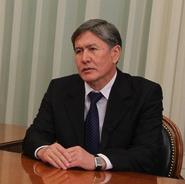BISHKEK, Kyrgyzstan -- For the past month, the word on everyone’s lips across Kyrgyzstan has been “raskol,” meaning “schism,” as voters nervously await a presidential election on Oct. 30 that will be an important test for the unity of the state. With the wounds of last year's revolution and ethnic violence still fresh, fears of a national conflict along north-south lines are running high, a possibility that holds important implications for regional politics and the U.S. withdrawal from Afghanistan.
Eighteen months after the April 2010 revolution that toppled authoritarian President Kurmanbek Bakiyev, Kyrgyzstan is struggling to consolidate its democracy in a region where authoritarian regimes are the rule. The pivotal event in the country’s new politics continues to be the ethnic violence in the southern city of Osh in June 2010, when local Uzbeks and Kyrgyz fought in the streets for three days, with Kyrgyz gangs attacking Uzbek neighborhoods using armored personnel carriers. Hundreds were killed, most of them Uzbeks, and many thousands left homeless.
When the interim government tried to assert control by removing Osh’s Kyrgyz nationalist mayor, Melis Myrzakmatov, he openly defied it. Myrzakmatov now runs the city as his fiefdom -- he recently announced a new city flag and hymn to be played at public events -- and Osh remains largely beyond the reach of the central government.

